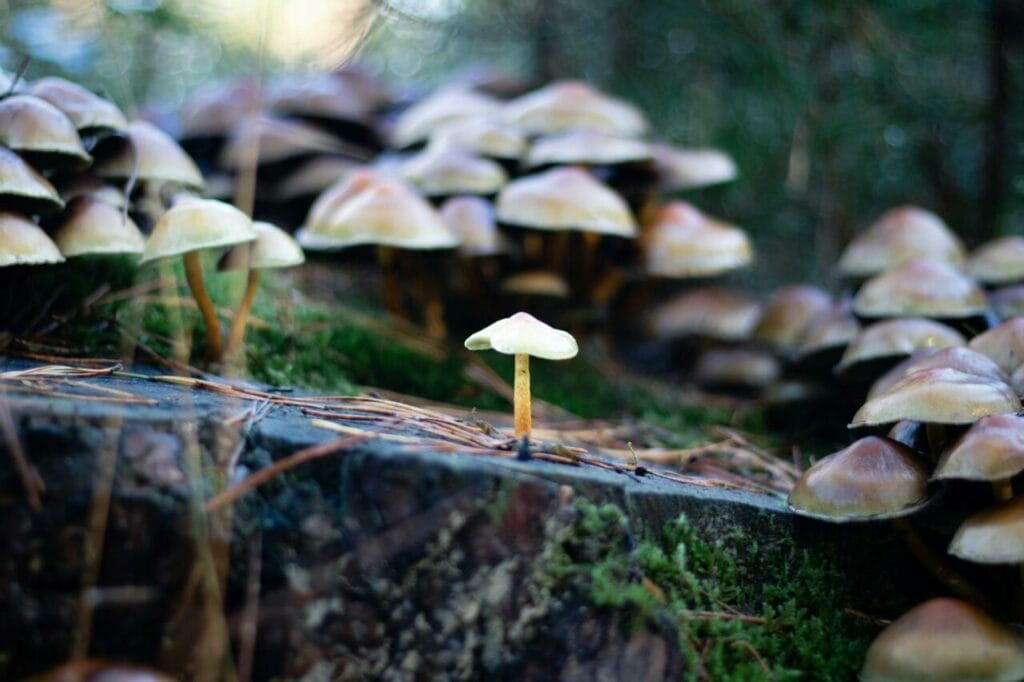Alzheimer’s Disease (AD) is a debilitating neurological condition without a known cure. As its prevalence grows, it presents significant challenges. Researchers are investigating better treatment options by studying both synthetic and natural alternatives.
Various clinical trials highlight the potential of serotonergic psychedelics such as LSD, DMT, and psilocybin for treating Alzheimer’s disease. For more fascinating insights, you are welcome to explore online resources or consider “purchasing psychedelics online in Canada.”
[toc]
The Use of Psychedelics in Alzheimer’s Treatment
Conventional psychedelics show promise for treating early-stage Alzheimer’s Disease (AD) or mild cognitive impairment (MCI) by encouraging brain cell growth.
Psychedelics could promote neural plasticity for learning and memory by targeting specific brain receptors. This may slow or even reverse the neurodegenerative effects of AD. Additionally, psychedelics might alleviate depression and anxiety, which are commonly associated with AD patients, by inducing positive psychological impacts.
Questions remain about how psychedelic treatments work. Some believe that profound effects, such as mystical experiences or a sense of self-dissolution from high-dose psychedelics, are essential for reaping psychological benefits. Others argue that the key lies in the biological changes prompted by these substances. Both viewpoints may have merit.
Conventional psychedelics appear to help the brain adapt and reduce inflammation, even at lower doses. Therefore, low-dose treatments might be beneficial for conditions like brain degeneration or migraines without causing significant mind-altering effects. However, for depression, anxiety, or addiction, the mind-altering effects seem essential, leading to introspection and behavioural changes. Hence, both low and high doses deserve further investigation for personalised therapy.
The Impact of Serotonergic Psychedelics
Serotonergic psychedelics, such as LSD (lysergic acid diethylamide), DMT (dimethyltryptamine), and psilocybin (found in magic mushrooms), are garnering attention due to their potential therapeutic benefits.
Psychedelics are garnering increased attention for their potential therapeutic benefits on multiple mental health disorders.
They are particularly relevant to conditions that affect mental health.
Specialists propose that serotonin receptors, which are recognized for their capacity to boost cognition and regulate neuroplasticity, represent an encouraging focus for research into Alzheimer’s Disease (AD).
Primarily, these substances exert their pharmacological impacts by modifying the serotonin system in the brain, leading to alterations in perception, mood, and consciousness. The following points summarize the findings from numerous studies that corroborate this notion:
- Particularly, the 5-HT2A subtype of the receptors affects the gene expression of neurotrophins that enhance neuroplasticity in brain regions impacted by AD.
- These receptors control cortical signalling, which is vital for cognition, memory, and synaptic plasticity.
- Despite their irregular distribution within neurons, serotonin receptors play a role in neural development, repair, and plasticity.
Significant Research Findings
- Serotonergic psychedelics have shown potential in alleviating aspects of AD pathology by promoting neuroplasticity.
- Traditional psychedelics impact neurotransmission, promote synaptic restructuring, and enhance factors that lend support to neuronal survival.
- Specific psychedelics, like muscimol and Sig-1R agonists, may reduce the neurotoxicity associated with AD progression.
- Traditional psychedelics stimulate pathways in brain regions affected by AD, hinting at the potential to slow down or reverse brain degeneration.
- Psilocybin mushrooms activate neural plasticity to encourage neurogenesis and bring about lasting changes in brain circuits.
- Psychedelics improve brain connectivity by targeting receptor genes and initiating alterations in neurons and networks.
Clinical investigations suggest that both traditional and non-traditional psychedelics from magic mushrooms affect various biological processes in the brain. These impacts comprise rapid changes in gene expression and significant shifts in brain structure and function.
These psychedelics engage with receptors such as serotonin, sigma, NMDA, and GABA, resulting in increased synaptic plasticity and brain revitalization. Thus, psychedelics may have beneficial effects on behaviour, memory, and cognition, positioning them as potential treatment options for AD and similar disorders.
Order Psychedelics Online in Canada
Welcome to our digital storefront, your destination for a wide variety of psychedelic products in British Columbia, Canada. If you’re considering microdosing magic mushrooms, we advise you to source them from a reputable medicinal mushroom dispensary.
- LSD
LSD is a synthetic substance derived from ergot, a type of fungus found on rye grains. This potent psychoactive compound can modify perceptions, emotions, and thought processes, even in minimal amounts.
Excessive consumption of LSD can induce severe hallucinations, warping your perception of time and space. Please be vigilant since substances marketed as LSD could potentially be other drugs, such as NBOMe or compounds from the 2C drug family.
| Product | Kittease – Ketamine Microdose Troche (30x50mg) | Zenly – LSD Gel Tabs – 600ug (100ug Per Tab) | Zenly – LSD Gummies – Sour Zen Berry – 200ug (100ug Per Gummy) |
| Purposed Use | Stress, depression, pain management, PTSD, OCD, work-induced stress, performance anxiety, insomnia, and addiction. | Unparalleled experiences | Unparalleled experiences |
| Recommended Dosage | 50mg per troche / 30 per pack – 1.5 grams of ketamine/ per pack | 600ug total/6 Tabs (100ug/Tab) | 200ug total/2 Gummies (100ug/Gummy) |
| Usage Instructions | Consume a full troche | Swallow a complete tab for the full effect. Wait a minimum of 2 hours before consuming another. | Enjoy an entire gummy for the full effect. Wait at least 2 hours before consuming another. |
| Benefits | Quick action with minimal risk, increased openness, ideal for introspection and cognitive enhancement. | Precisely measured dose for an optimal trip, lab-verified | Precisely measured dose for an optimal trip, lab-verified |
- Magic Mushrooms
Over 180 species of mushrooms are acknowledged to contain psilocybin and psilocin, compounds lauded for their therapeutic effects and positive impact. on mental health.
The impacts may vary based on the type of mushroom, cultivation batch, amount consumed, and individual tolerance. While some individuals lean towards microdosing for mild effects, others opt for higher doses for a more intense experience. The quality of the mushrooms may also differ based on the cultivation techniques employed.
Blue Meanies, scientifically known as Panaeolus cyanescens, are small dried mushrooms that flourish in warm tropical climates, typically on cow and water buffalo dung. As they grow, they develop blue spots on their surface, which is the source of their name.
- These mushrooms are rich in psilocybin and psilocin, which are highly concentrated.
- They have a history of being used recreationally, especially among the Balinese people, who consume them during celebrations and for artistic inspiration.
- Due to their hallucinogenic effects, they are popular among tourists and travelers in Bali and similar places. These effects can include feelings of euphoria, hallucinations, happiness, and bouts of intense laughter.
- DMT
DMT, a potent hallucinogenic compound, is found in certain plants such as Psychotria viridis and Chacruna. Commonly referred to as the “spirit molecule,” these controlled substances can trigger deep psychedelic experiences, offering a short but intensely immersive journey characterized by colorful visual and auditory hallucinations.
| Product | Dream Machine – Vape Cartridge – DMT 1ml | Integral Alchemist – ACACIA Changa Pre-Roll | Integral Alchemist – Mimosa- 1ml DMT Vape Cart |
| Description | Explore hyperdimensional realms with DMT. | Feel effects similar to ayahuasca, with a blend of herbs and DMT. | Embark on a journey of mystic visions and spiritual revelations with DMT. |
| DMT Content | 1g | Approximately 90mg | 1ml |
| Instructions | Preheat the cartridge and inhale | Enjoy the pre-roll at a speed that suits you. | Draw in the vapor for instant effects. |
| Effects | Intense hallucinations, altered states of consciousness. | A visual psychedelic experience, prolonged duration. | Spiritual awakening, intense happiness, significant changes in viewpoint. |
| Duration | Varies per individual | Can last up to 1 hour | Can last up to 30 minutes |
The Long-Term Effects of Psychedelic Use
Present studies aim to comprehend the extended effects of using psychoactive substances. The term “long-term effects” denotes any lasting changes in cognition, emotion, or memory after consistent use of psychedelics, even though our understanding in this field is still expanding.
The examination of the enduring influences of psychedelics is complex. Some studies suggest potential mental health benefits, while others propose possible risks, including the onset of psychosis.
Nevertheless, in the midst of this complexity, scientists persist in their efforts to understand the effects of long-term psychedelic use on mental health. They are conducting rigorous studies, monitoring individuals over long periods to collect more accurate data.
Acquire Cannabis from a Trusted Supplier
Research indicates a significant shift in the treatment of Alzheimer’s disease, suggesting that psychedelics could redefine how we tackle brain disorders. Experts posit that the therapeutic use of these substances could completely transform Alzheimer’s treatment, providing newfound optimism for numerous patients and their families.
For premium products, opt for a trusted supplier like Magic Mushrooms Edmonton Canada. Providing a wide variety of cannabis products, including flowers, edibles, and concentrates, Magic Mushrooms Edmonton Canada ensures genuine, lab-tested items that adhere to rigorous food and drug regulations.
Purchase shrooms online today.
Frequently Asked Questions
What distinguishes psychedelics from other substances commonly used in Alzheimer’s treatments?
Psychedelics differentiate themselves from traditional Alzheimer’s medications due to their therapeutic approach and effects. By targeting the brain’s serotonin system, they stimulate new neural connections, leading to profound psychological experiences that foster emotional wellbeing.
Unlike standard drugs that primarily manage symptoms, psychedelics are being assessed by Health Canada for their lasting benefits and comprehensive treatment approach, which integrates therapy.
The study into the use
The therapeutic potential of psilocybin for treating conditions like obsessive-compulsive disorder, coupled with its safe profile that avoids multi-system organ failure, distinguishes it from traditional controlled substances.
Can psychedelic-assisted therapy be considered a viable treatment for Alzheimer’s patients facing end-of-life distress?
Psychedelic-assisted therapy could offer significant benefits for Alzheimer’s patients who are seriously ill and confronting the reality of their mortality.
- Offers emotional comfort. This therapeutic approach is known to ease feelings of anxiety and depression in some individuals, especially those who are gravely ill. This could potentially also be beneficial for Alzheimer’s patients.
- Safe under professional supervision. When administered in a controlled environment with guidance from a professional therapist, the use of such psychedelics usually does not cause harm and is well tolerated by most individuals.
- May improve quality of life. For an Alzheimer’s patient, emotional wellbeing can significantly enhance their quality of life, even if there is no improvement in memory function.
- Further research is necessary. While this therapy shows promise, more studies are required to validate its safety and effectiveness for Alzheimer’s patients, particularly those in the later stages of life.
How long does a psychedelic therapy session for Alzheimer’s patients last?
- Preparation Phase. This phase involves one or two sessions, each ranging from 1 to 2 hours. The purpose of these sessions is to prepare the patient for the forthcoming experience, establish expectations, and build a trusting relationship with the therapist.
- Psychedelic Session. This critical session, during which the patient consumes the psychedelic substance, typically lasts between 4 to 6 hours. The patient spends this time in a controlled environment, often lying down with eye shades and listening to music, while therapists monitor them closely.
- Integration Phase. After the session, follow-up meetings are held to help the patient process and integrate their experience. These sessions usually last 1 to 2 hours each, with the number of follow-ups varying.
You might also be interested in:





